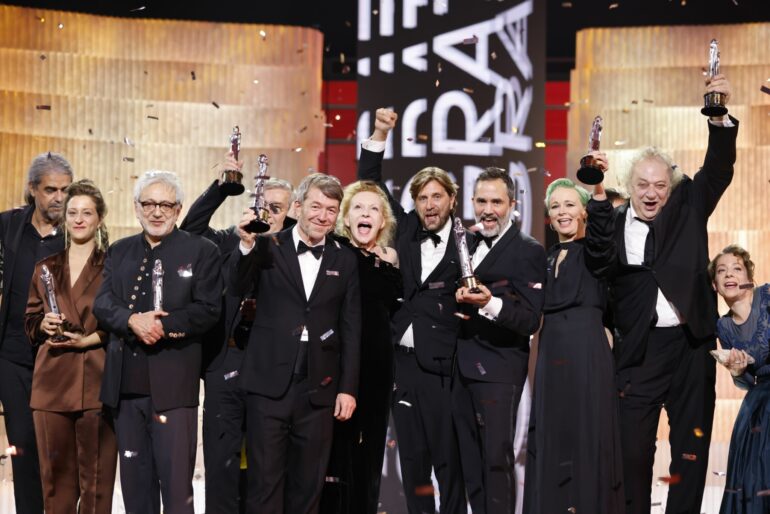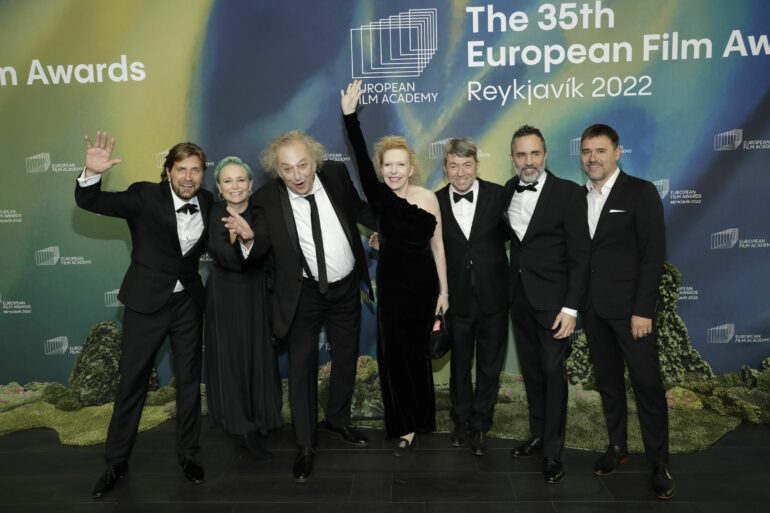Written by: Annika Pham
11.12.22
Ruben Östlund turned his four nominations for Triangle of Sadness into awards, five years after he set a record with six EFAs for The Square.
The 35th ceremony of the European Film Awards was held in person Saturday at Reykjavik’s enchanting Harpa Concert Hall which welcomed 1,250 international guests.
A top favourite, together with Ali Abbasi’s Holy Spider, the Palme d’or winning film Triangle of Sadness backed by Nordisk Film & TV Fond took home Best European Film, Best Director, Best Script awards (for Östlund), while Croatian-Danish Zlatko Burić was crowned Best European Actor for his role as Russian fertiliser magnate Dimitri.
Östlund paid tribute to his ensemble cast and in particular to South African actress Charlbi Dean who passed away in August after a sudden illness, aged 32. “Please have a look at the film, and check her performance, its imprint, to pay legacy to that performance”, insisted the writer/director.
While standing on stage next to Östlund, actors Burić, Harris Dickinson, Vicki Berlin, Sunnyi Melles, and producing partner Philippe Bober, Östlund’s long-time producer Erik Hemmendorff of Plattform Produktion said: “I love the idea that we have a European film community. It has been a starting point for a lot of things in this film,” he said, mentioning the multiple nationalities associated to the Swedish/French/German/UK co-production.
A fierce defender of European auteur cinema, Bober who has worked since 2008 with Östlund and Hemmendorff added that if we look beyond the film financing, “what comes to mind is that Europe is the place where cinema originated”, he said. “It originated with filmmakers, and our industry is built around them, to support and distribute their works. It’s quite different on the other side of the Atlantic where you have pipelines, and have to find something to put in those pipelines,” he noted before adding: “Triangle of Sadness was Ruben’s idea, that we collectively wanted to be limitless, to grow as far as possible and embrace the audience. We wanted to have an auteur film for the audience,” he reminded the prestigious Harpa hall VIPs.
In other categories, Vicky Krieps - lead actress of Austria’s Corsage - beat Holy Spider’s Cannes winner Zar Amir Ebrahimi, the Spanish satire The Good Boss was preferred to Iceland’s Cop Secret for Best Comedy and Lithuania’s Mariupolis 2 prevailed over another Ukraine-set outstanding documentary film, Denmark’s A House Made of Splinters.
Speaking on behalf of Mariupolis 2’s EFA winner Mantas Kvedaravičius (who was killed in the besieged city of Mariupol), his daughter paid a moving tribute to the late filmmaker/anthropologist: “I am proud of him. He lost his life while delivering medicine to people. I was fortunate to have had someone so brilliant in my life!”.
Tribute to Ukraine
In the midst of the joyful celebration of European cinema, the crucial need to support Ukraine, its culture and film industry was highlighted by the Eurimages Co-Production Award, handed out exceptionally not to a single person, but to all producers of Ukraine.
“War has shattered Ukraine, but some Ukrainian films are still travelling, some are being nominated at the EFA. We want to make sure films from Ukraine can continue to be made-no matter what,” pointed out Eurimages’ executive director Susan Newman-Baudais.
Read our story EFA member and producer Julia Sinkevych on best ways to support Ukraine: CLICK HERE.
Producer Darya Bassel who picked up the Eurimages symbolic award with her counterpart Julia Sinkevych on behalf of Ukrainian producers, said: “We wouldn’t be here physically [to take this award] if it wasn’t for the resistance of our nation, courage of our colleagues who went to the front line, and for the support and solidarity of the European film community.” Both pledged for greater and continues support, notably for the Dovzhenko National Centre in Kyiv, to preserve their nation’s film heritage.
The European Film Academy’s director Matthijs Wouter Knol and chairman Mike Downey both underlined the need to rebuild the Ukrainian film industry’s infrastructure and basic needs, and mentioned one of many initiatives welcoming donations: the International Coalition for Filmmakers at Risk (ICFR), set up in February with IDFA and the Rotterdam International Film Festival. (For more information: CLICK HERE).
Another urgent political topic-climate change was spotlighted with the first European Sustainability Award, give out to the European Commission’s European Green deal.
In a video transmission, Ursula von der Leyen, President of the European Commission said: “Governments can only do so much and we need every person, every community and every industry to change, so I’m so glad the European film industry is taking this commitment so seriously. Because you have the power to challenge the hearts and minds to make people see that everyone can make a difference for our planet. I dedicate this prize to all filmmakers that will bring our climate conscious one step forward.”
The 35th EFA awards was hosted by popular Icelandic artist Hugleikur Dagsson and actress Ilmur Kristjánsdóttir (Trapped, Sisterhood).
Among the award presenters were Danish actor Nikolaj Coster-Waldau, actress Nukâka Coster-Waldau and Icelandic director Baltasar Kormákur.

